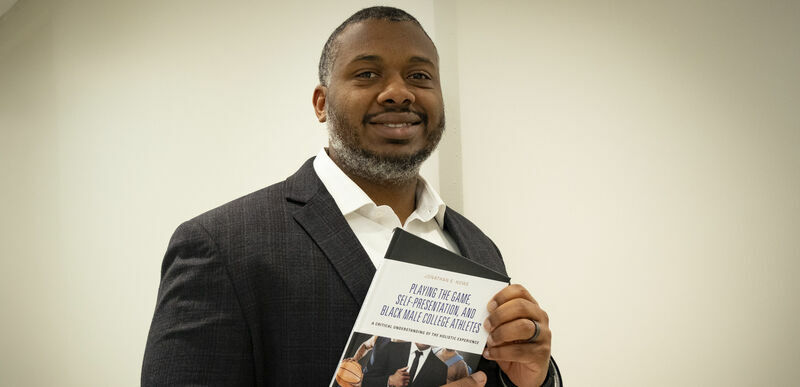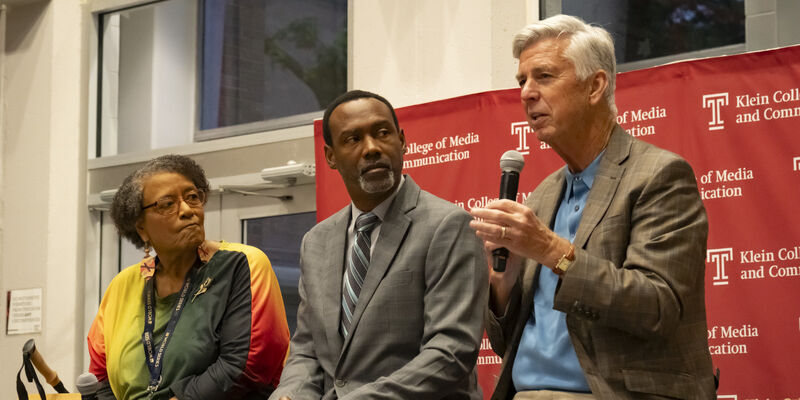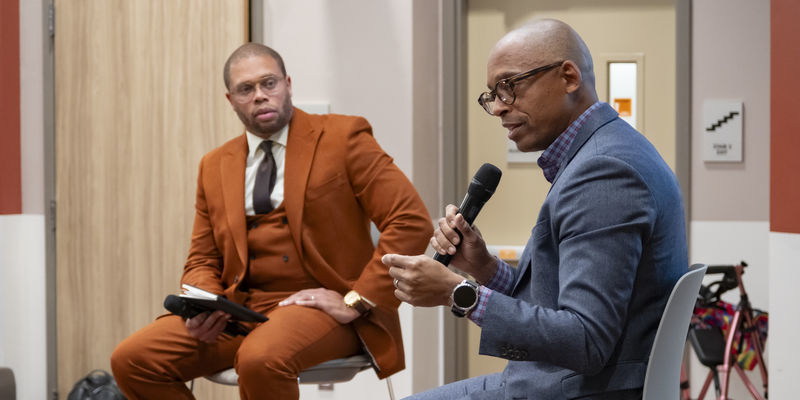Eight Seconds to Glory: Temple University and 8 Seconds Rodeo celebrate Black cowboy culture
Faculty experts and community leaders discuss the traditions, representation and enduring influence of Black cowboy culture.

Temple University’s Klein College of Media and Communication partnered with the 8 Seconds Rodeo to host an engaging and thought-provoking event, Eight Seconds to Glory: A Panel Exchange on Black Rodeo and Cowboy Culture in Philadelphia. The panel explored the rich traditions, enduring impact and modern resurgence of the Black cowboy in America—particularly in Philadelphia, a city with deep yet often overlooked ties to urban riding culture.
Held Friday, Oct. 3, in Temple’s Center for Anti-Racism, the discussion was facilitated by David Brown, associate professor and assistant dean for community and communications at the Klein College of Media and Communication. The panel featured Ivan McClellan, founder of 8 Seconds Rodeo; Erin Brown, executive director of the Philadelphia Urban Riding Academy; Jonathan Howe, assistant professor in the School of Sport, Tourism and Hospitality Management (STHM); and Timothy Welbeck, assistant professor of instruction in Africology and African American studies and director of Temple’s Center for Anti-Racism.
“When we learned 8 Seconds Rodeo was coming to Philadelphia, we saw an incredible opportunity to connect this growing cultural movement to our local story,” said David Brown. “Beyond the event, we wanted to celebrate a legacy that’s been part of North Philadelphia’s story for generations. The spirit, determination and creativity of this community are what make the cowboy culture here so powerful, and we wanted to share that with our Temple family.”
McClellan kicked off the conversation by reflecting on the deep history and significance of Black cowboy culture. McClellan spoke about how, for generations, Black riders have used horsemanship and competition as pathways to community, artistry and self-determination—from the working cowhands of the 19th century to the modern athletes carrying that legacy forward in cities like Philadelphia. These traditions, he noted, represent both sport and storytelling—a living expression of resilience, pride and identity that continues to shape American culture today.
He then shared his personal journey, growing up with a love for cowboy culture yet rarely seeing anyone who looked like him represented in it. That absence became the catalyst for his creation of the 8 Seconds Rodeo in 2023. “Eight seconds,” he explained, “is how long you need to stay on a bull to earn a qualifying score.” His goal was to transform rodeo culture into an inclusive, celebratory space that merges community, hip-hop and heritage—a place where everyone feels they belong.
Reflecting on what it means to bring the rodeo to Philadelphia, McClellan said, “It’s incredible—we’re bringing bulls and dump trucks full of dirt down Broad Street, right into the heart of North Philly.” He added, “It’s an honor to bring a culture I discovered in rural Oklahoma into one of the most vibrant cities in America. Philly’s going to bring its grit, its soul and this is going to be a completely unique event like no one’s ever seen.”
Picking up on that theme of visibility, Erin Brown noted, “It’s taken time, but we’re finally seeing brands recognize the real diversity that’s always existed in rodeo.” Brown, who has partnered with companies like Wrangler and Red Wing, reflected on how national campaigns rarely featured Black cowboys or cowgirls, a narrative that’s only recently begun to shift. Her remarks underscored a broader theme echoed throughout the panel: the need to reclaim visibility and recognition for the athletes and communities who helped shape the sport from the beginning.
For Erin Brown, the conversation was deeply personal. As a North Philadelphia native, she discovered her love for horses at just 6 years old through the Fletcher Street Stables. The community there, she said, “became family” and a safe haven where she learned, competed and later guided others. Today, as executive director of the Philadelphia Urban Riding Academy, Brown continues to preserve that legacy by teaching youth horsemanship, leadership and cultural pride—particularly for young women, whose representation in the sport remains limited.
Reflecting on her journey, Brown shared, “It’s amazing to be a voice and a vision for a younger and newer generation, because at the level I’m at, I didn’t always have this. I needed someone who looked like me out there, so I could be confident enough to do the things I’m doing now.”
Howe and Welbeck expanded the dialogue to explore how events like 8 Seconds Rodeo empower Black athletes and artists to show up authentically in spaces where they’ve often felt pressure to assimilate. Howe emphasized that authenticity resonates on multiple levels: personally, socially and economically.
“People tend to invest in things and people that they admire, feel connected to or believe are authentic,” Howe said. “Your work and value isn’t just what you do on the field, but also the impact you make when you show up to a space as your authentic self and the value you bring by just being you.” He added that athletes should surround themselves with people who empower and celebrate them holistically, creating environments where identity and excellence can coexist.
Welbeck, whose recent course Kendrick Lamar and the Morale of M.A.A.D City drew national attention, connected the cultural threads between hip-hop, rodeo and identity. He noted that the 8 Seconds Rodeo redefines what it means to be American by reclaiming a space Black communities helped build. “It’s really terrific to be able to do something like this,” said Welbeck. “We’re celebrating something impactful and powerful that’s happening in our community, showcasing its beauty, richness and depth and empowering people to see the value in what we create. I hope young people in our community can see themselves in this and be inspired by it.”
The event concluded with a raffle giveaway for tickets to the upcoming 8 Seconds Rodeo showcase on Oct. 11, where attendees will experience the culture firsthand, complete with community gatherings, performances and music by Philly’s own DJ Diamond Kuts. As the conversation wrapped, one sentiment echoed clearly throughout the room: The story of the Black cowboy is not a relic of the past—it’s a living, evolving narrative.
“Storytelling is what keeps culture alive,” said David Brown. “By creating space for dialogue and celebration, Temple University and 8 Seconds Rodeo are helping to ensure that this legacy continues to ride strong into the future.


